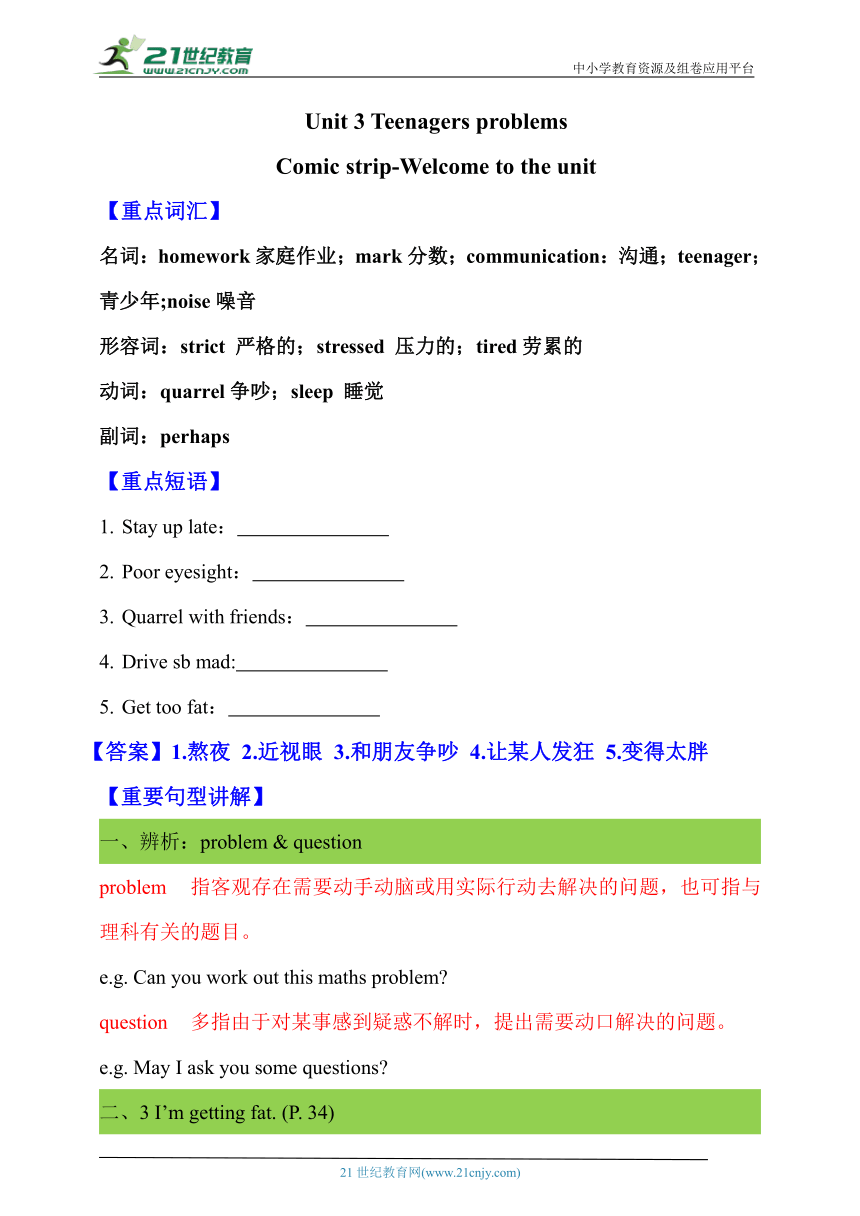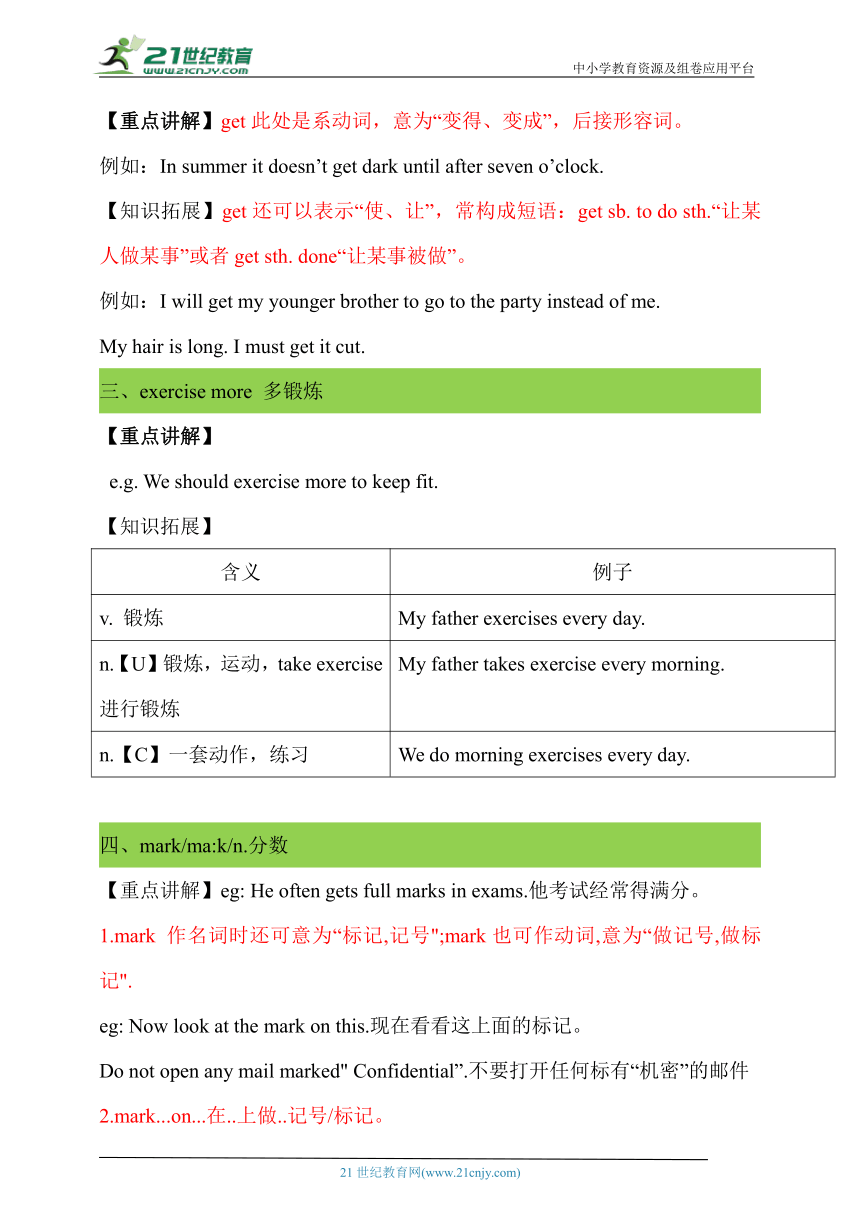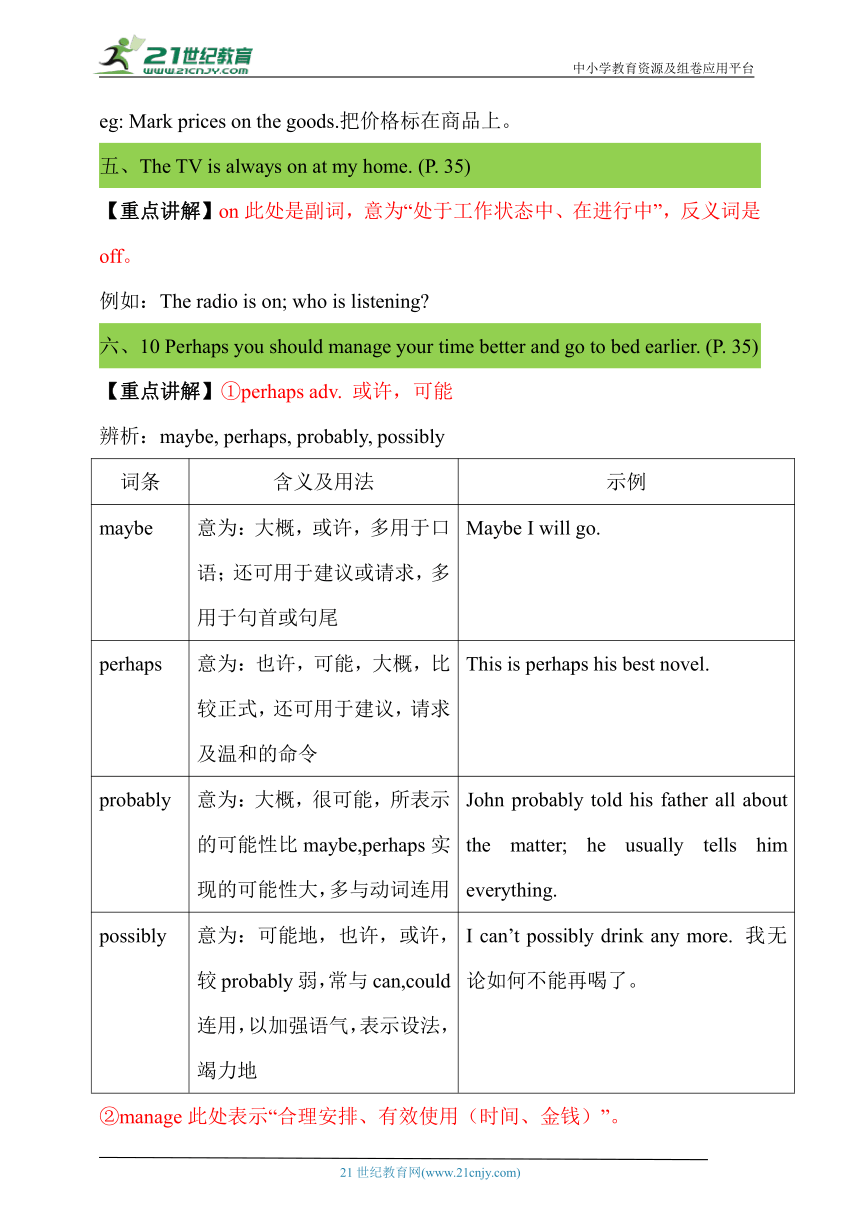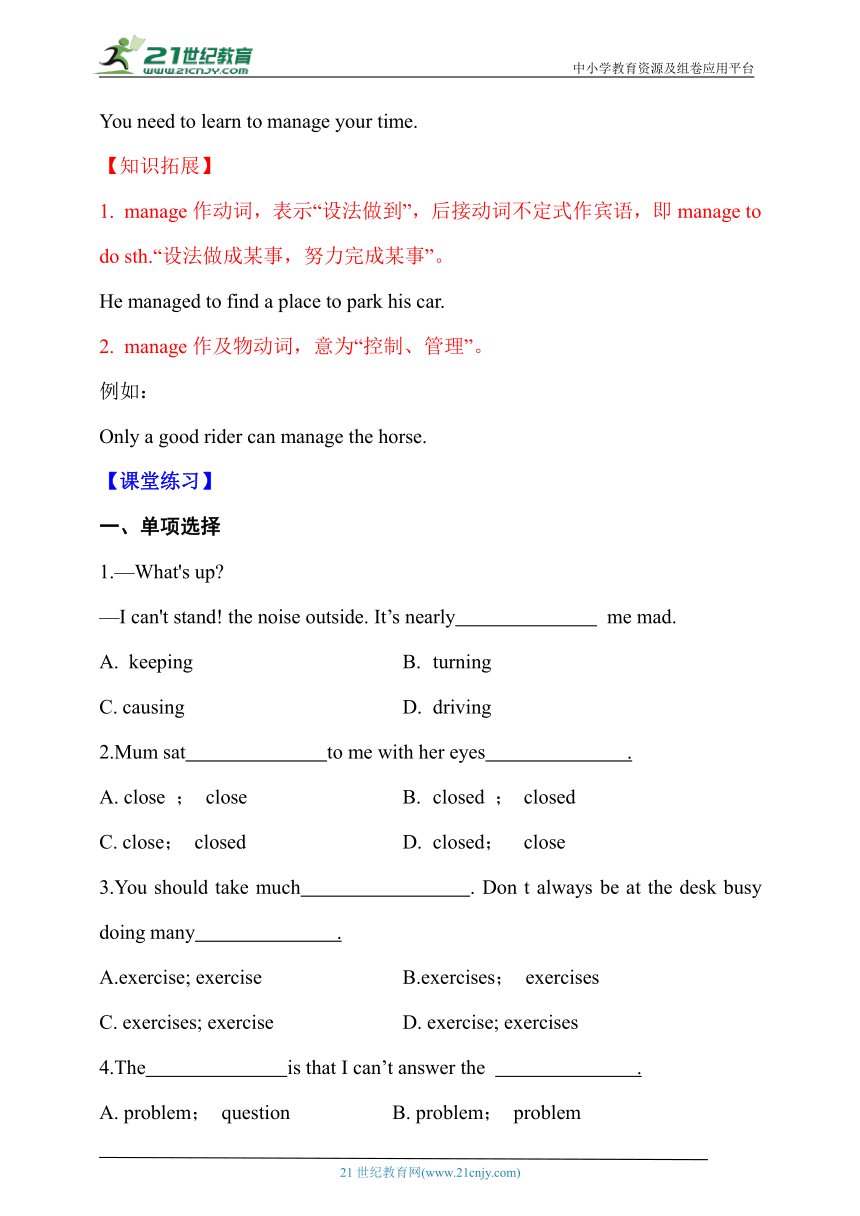Unit3 Teenage problems 课时1 Comic strip& Welcome to the unit 精讲精练(重点词汇+句型+课堂练习)【牛津译林版版九上英语】
文档属性
| 名称 | Unit3 Teenage problems 课时1 Comic strip& Welcome to the unit 精讲精练(重点词汇+句型+课堂练习)【牛津译林版版九上英语】 |

|
|
| 格式 | docx | ||
| 文件大小 | 286.4KB | ||
| 资源类型 | 试卷 | ||
| 版本资源 | 牛津译林版 | ||
| 科目 | 英语 | ||
| 更新时间 | 2024-09-04 14:13:37 | ||
图片预览




文档简介
中小学教育资源及组卷应用平台
Unit 3 Teenagers problems
Comic strip-Welcome to the unit
【重点词汇】
名词:homework家庭作业;mark分数;communication:沟通;teenager;青少年;noise噪音
形容词:strict 严格的;stressed 压力的;tired劳累的
动词:quarrel争吵;sleep 睡觉
副词:perhaps
【重点短语】
Stay up late:
Poor eyesight:
Quarrel with friends:
Drive sb mad:
Get too fat:
【答案】1.熬夜 2.近视眼 3.和朋友争吵 4.让某人发狂 5.变得太胖
【重要句型讲解】
一、辨析:problem & question
problem 指客观存在需要动手动脑或用实际行动去解决的问题,也可指与理科有关的题目。
e.g. Can you work out this maths problem
question 多指由于对某事感到疑惑不解时,提出需要动口解决的问题。
e.g. May I ask you some questions
二、3 I’m getting fat. (P. 34)
【重点讲解】get此处是系动词,意为“变得、变成”,后接形容词。
例如:In summer it doesn’t get dark until after seven o’clock.
【知识拓展】get还可以表示“使、让”,常构成短语:get sb. to do sth.“让某人做某事”或者get sth. done“让某事被做”。
例如:I will get my younger brother to go to the party instead of me.
My hair is long. I must get it cut.
三、exercise more 多锻炼
【重点讲解】
e.g. We should exercise more to keep fit.
【知识拓展】
含义 例子
v. 锻炼 My father exercises every day.
n.【U】锻炼,运动,take exercise 进行锻炼 My father takes exercise every morning.
n.【C】一套动作,练习 We do morning exercises every day.
四、mark/ma:k/n.分数
【重点讲解】eg: He often gets full marks in exams.他考试经常得满分。
1.mark 作名词时还可意为“标记,记号";mark也可作动词,意为“做记号,做标记".
eg: Now look at the mark on this.现在看看这上面的标记。
Do not open any mail marked" Confidential”.不要打开任何标有“机密”的邮件
2.mark...on...在..上做..记号/标记。
eg: Mark prices on the goods.把价格标在商品上。
五、The TV is always on at my home. (P. 35)
【重点讲解】on此处是副词,意为“处于工作状态中、在进行中”,反义词是off。
例如:The radio is on; who is listening
六、10 Perhaps you should manage your time better and go to bed earlier. (P. 35)
【重点讲解】①perhaps adv. 或许,可能
辨析:maybe, perhaps, probably, possibly
词条 含义及用法 示例
maybe 意为:大概,或许,多用于口语;还可用于建议或请求,多用于句首或句尾 Maybe I will go.
perhaps 意为:也许,可能,大概,比较正式,还可用于建议,请求及温和的命令 This is perhaps his best novel.
probably 意为:大概,很可能,所表示的可能性比maybe,perhaps实现的可能性大,多与动词连用 John probably told his father all about the matter; he usually tells him everything.
possibly 意为:可能地,也许,或许,较probably弱,常与can,could连用,以加强语气,表示设法,竭力地 I can’t possibly drink any more. 我无论如何不能再喝了。
②manage此处表示“合理安排、有效使用(时间、金钱)”。
You need to learn to manage your time.
【知识拓展】
manage作动词,表示“设法做到”,后接动词不定式作宾语,即manage to do sth.“设法做成某事,努力完成某事”。
He managed to find a place to park his car.
manage作及物动词,意为“控制、管理”。
例如:
Only a good rider can manage the horse.
【课堂练习】
单项选择
1.—What's up
—I can't stand! the noise outside. It’s nearly me mad.
keeping B. turning
C. causing D. driving
2.Mum sat to me with her eyes .
A. close ; close B. closed ; closed
C. close; closed D. closed; close
3.You should take much . Don t always be at the desk busy doing many .
A.exercise; exercise B.exercises; exercises
C. exercises; exercise D. exercise; exercises
4.The is that I can’t answer the .
A. problem; question B. problem; problem
C. question; question D. question; problem
5.The man is so brave that he lives on the island.
A. alone; alone B. lonely; lonely
C. lonely; alone D. alone; lonely
适当形式填空
1.I have never been to the Ocean Park. I can only ________ what it is like.(imagination)
2.There is no need for you ________ (worry) about the weather.
3.I always feel nervous before the final ______(examine).
4.Careless driving usually _______ (cause) many traffic accidents.
5.Could you give us some ______ (suggest)
三、选用方框内所给短语的正确形式填空
drive sb. mad why not feel sleepy manage one's time feel lonely
1.I always worried someone would notice me,and then when no one did,I .
2.Long hours' work almost when I worked in that factory.
3.Spring has come. I always .
4.We’ll go to the park with Jack this afternoon. ask Mary to go with us?
5.If you want to study well,I think you should learn how .
四、完型填空
All of us have habits. These habits may affect(影响)us a lot. Some of these habits are ________ to change; Some are not. We always try to change them, but we often ________ at last. Usually some bad habits are ________ than we think to break them. Why
We develop good and bad habits ________ we are young. Some bad habits, such as bad table ________ and biting our fingers, are the ________ that are hard to get rid of(摆脱). Even more, the good habits you thought might be ________ on as the bad ones by others.
How can we force ourselves to ________ those habits The answer is ________ the change step by step. First, know what your bad habits are and then deal with them one by one. You can do it! ________ it is difficult to change bad habits, it’s not impossible!
1.A.glad B.easy C.impossible D.fast
2.A.put up B.take away C.give up D.put on
3.A.harder B.easier C.less D.more
4.A.where B.how C.before D.when
5.A.manners B.ways C.performances D.behaviors
6.A.things B.matters C.ones D.persons
7.A.looked B.watched C.known D.called
8.A.find B.change C.make D.miss
9.A.start B.write C.develop D.get
10.A.Because B.Though C.And D.So
【答案】
一、DCDAD
二、1.imagine 2.to worry 3.exam 4.causes 5.suggestions
三、1.felt lonely 2.drove me mad 3.feel sleepy 4.Why not 5.to manage your time
四、BCADA CABAB
【答案】
一、BBCACD
二、1.sadness 2,difficulty 3.decision 4.worried 5.feeling
三、1.It’s time for us to make a decision.
Please remind me of the meeting on Friday if I forget.
He explained to me what this machine could do.
The environment around us can change our moods.
5.You must take action, or you will fall behind others.
四、CBA
21世纪教育网 www.21cnjy.com 精品试卷·第 2 页 (共 2 页)
21世纪教育网(www.21cnjy.com)
Unit 3 Teenagers problems
Comic strip-Welcome to the unit
【重点词汇】
名词:homework家庭作业;mark分数;communication:沟通;teenager;青少年;noise噪音
形容词:strict 严格的;stressed 压力的;tired劳累的
动词:quarrel争吵;sleep 睡觉
副词:perhaps
【重点短语】
Stay up late:
Poor eyesight:
Quarrel with friends:
Drive sb mad:
Get too fat:
【答案】1.熬夜 2.近视眼 3.和朋友争吵 4.让某人发狂 5.变得太胖
【重要句型讲解】
一、辨析:problem & question
problem 指客观存在需要动手动脑或用实际行动去解决的问题,也可指与理科有关的题目。
e.g. Can you work out this maths problem
question 多指由于对某事感到疑惑不解时,提出需要动口解决的问题。
e.g. May I ask you some questions
二、3 I’m getting fat. (P. 34)
【重点讲解】get此处是系动词,意为“变得、变成”,后接形容词。
例如:In summer it doesn’t get dark until after seven o’clock.
【知识拓展】get还可以表示“使、让”,常构成短语:get sb. to do sth.“让某人做某事”或者get sth. done“让某事被做”。
例如:I will get my younger brother to go to the party instead of me.
My hair is long. I must get it cut.
三、exercise more 多锻炼
【重点讲解】
e.g. We should exercise more to keep fit.
【知识拓展】
含义 例子
v. 锻炼 My father exercises every day.
n.【U】锻炼,运动,take exercise 进行锻炼 My father takes exercise every morning.
n.【C】一套动作,练习 We do morning exercises every day.
四、mark/ma:k/n.分数
【重点讲解】eg: He often gets full marks in exams.他考试经常得满分。
1.mark 作名词时还可意为“标记,记号";mark也可作动词,意为“做记号,做标记".
eg: Now look at the mark on this.现在看看这上面的标记。
Do not open any mail marked" Confidential”.不要打开任何标有“机密”的邮件
2.mark...on...在..上做..记号/标记。
eg: Mark prices on the goods.把价格标在商品上。
五、The TV is always on at my home. (P. 35)
【重点讲解】on此处是副词,意为“处于工作状态中、在进行中”,反义词是off。
例如:The radio is on; who is listening
六、10 Perhaps you should manage your time better and go to bed earlier. (P. 35)
【重点讲解】①perhaps adv. 或许,可能
辨析:maybe, perhaps, probably, possibly
词条 含义及用法 示例
maybe 意为:大概,或许,多用于口语;还可用于建议或请求,多用于句首或句尾 Maybe I will go.
perhaps 意为:也许,可能,大概,比较正式,还可用于建议,请求及温和的命令 This is perhaps his best novel.
probably 意为:大概,很可能,所表示的可能性比maybe,perhaps实现的可能性大,多与动词连用 John probably told his father all about the matter; he usually tells him everything.
possibly 意为:可能地,也许,或许,较probably弱,常与can,could连用,以加强语气,表示设法,竭力地 I can’t possibly drink any more. 我无论如何不能再喝了。
②manage此处表示“合理安排、有效使用(时间、金钱)”。
You need to learn to manage your time.
【知识拓展】
manage作动词,表示“设法做到”,后接动词不定式作宾语,即manage to do sth.“设法做成某事,努力完成某事”。
He managed to find a place to park his car.
manage作及物动词,意为“控制、管理”。
例如:
Only a good rider can manage the horse.
【课堂练习】
单项选择
1.—What's up
—I can't stand! the noise outside. It’s nearly me mad.
keeping B. turning
C. causing D. driving
2.Mum sat to me with her eyes .
A. close ; close B. closed ; closed
C. close; closed D. closed; close
3.You should take much . Don t always be at the desk busy doing many .
A.exercise; exercise B.exercises; exercises
C. exercises; exercise D. exercise; exercises
4.The is that I can’t answer the .
A. problem; question B. problem; problem
C. question; question D. question; problem
5.The man is so brave that he lives on the island.
A. alone; alone B. lonely; lonely
C. lonely; alone D. alone; lonely
适当形式填空
1.I have never been to the Ocean Park. I can only ________ what it is like.(imagination)
2.There is no need for you ________ (worry) about the weather.
3.I always feel nervous before the final ______(examine).
4.Careless driving usually _______ (cause) many traffic accidents.
5.Could you give us some ______ (suggest)
三、选用方框内所给短语的正确形式填空
drive sb. mad why not feel sleepy manage one's time feel lonely
1.I always worried someone would notice me,and then when no one did,I .
2.Long hours' work almost when I worked in that factory.
3.Spring has come. I always .
4.We’ll go to the park with Jack this afternoon. ask Mary to go with us?
5.If you want to study well,I think you should learn how .
四、完型填空
All of us have habits. These habits may affect(影响)us a lot. Some of these habits are ________ to change; Some are not. We always try to change them, but we often ________ at last. Usually some bad habits are ________ than we think to break them. Why
We develop good and bad habits ________ we are young. Some bad habits, such as bad table ________ and biting our fingers, are the ________ that are hard to get rid of(摆脱). Even more, the good habits you thought might be ________ on as the bad ones by others.
How can we force ourselves to ________ those habits The answer is ________ the change step by step. First, know what your bad habits are and then deal with them one by one. You can do it! ________ it is difficult to change bad habits, it’s not impossible!
1.A.glad B.easy C.impossible D.fast
2.A.put up B.take away C.give up D.put on
3.A.harder B.easier C.less D.more
4.A.where B.how C.before D.when
5.A.manners B.ways C.performances D.behaviors
6.A.things B.matters C.ones D.persons
7.A.looked B.watched C.known D.called
8.A.find B.change C.make D.miss
9.A.start B.write C.develop D.get
10.A.Because B.Though C.And D.So
【答案】
一、DCDAD
二、1.imagine 2.to worry 3.exam 4.causes 5.suggestions
三、1.felt lonely 2.drove me mad 3.feel sleepy 4.Why not 5.to manage your time
四、BCADA CABAB
【答案】
一、BBCACD
二、1.sadness 2,difficulty 3.decision 4.worried 5.feeling
三、1.It’s time for us to make a decision.
Please remind me of the meeting on Friday if I forget.
He explained to me what this machine could do.
The environment around us can change our moods.
5.You must take action, or you will fall behind others.
四、CBA
21世纪教育网 www.21cnjy.com 精品试卷·第 2 页 (共 2 页)
21世纪教育网(www.21cnjy.com)
